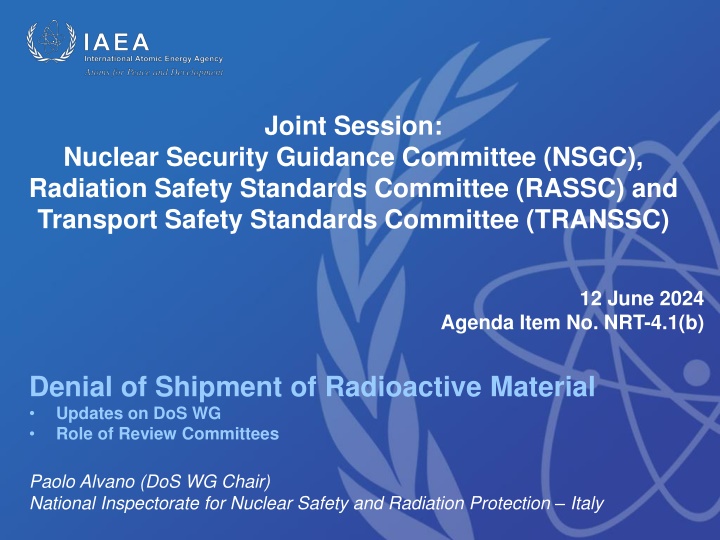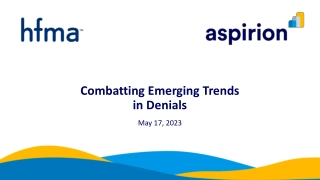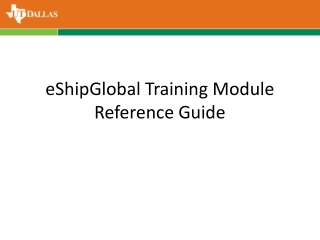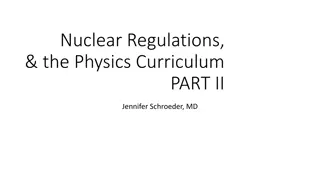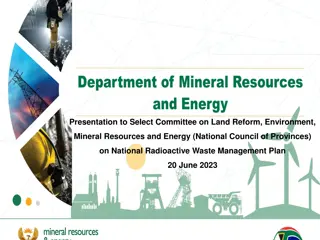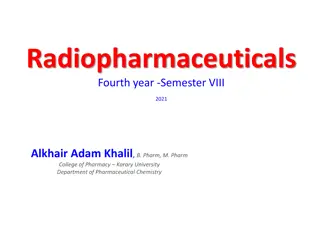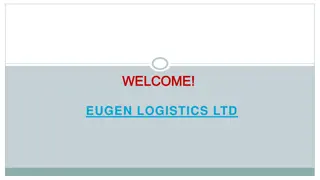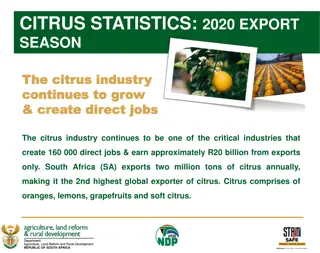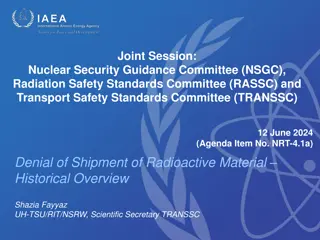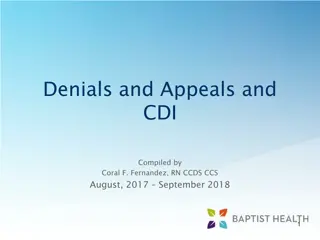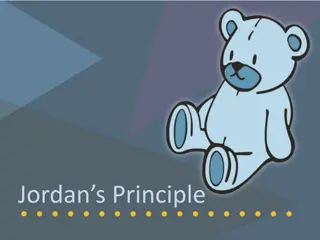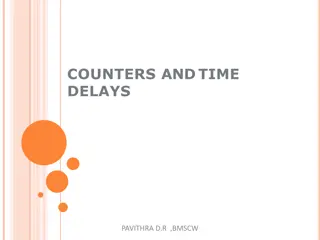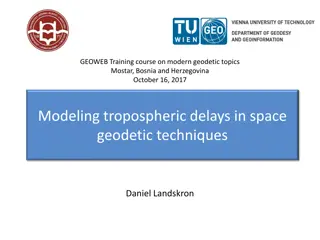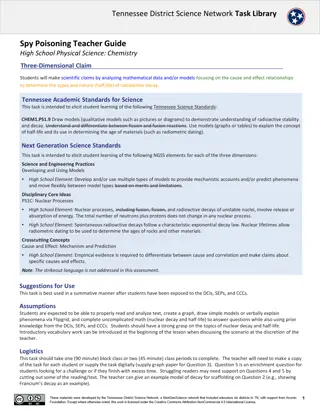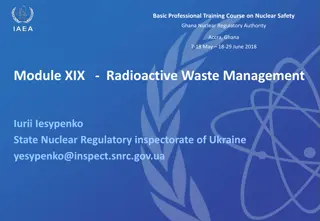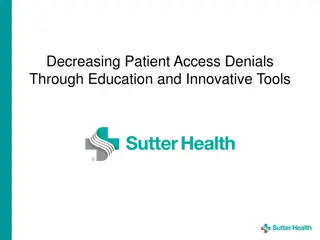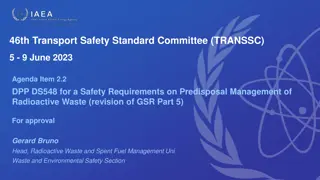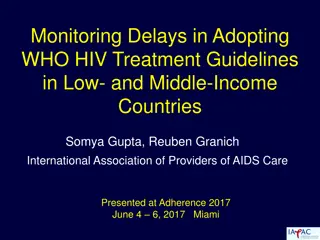Addressing Denials and Delays in Radioactive Material Shipments
Challenges and implications of denials and delays in the shipment of radioactive material. Discuss potential solutions and sustainable mechanisms to mitigate these issues, including the proposal of a code of conduct for safe and secure transport. Evaluate root causes, develop metrics for periodic review, and strategize awareness and training initiatives for involved parties.
Download Presentation

Please find below an Image/Link to download the presentation.
The content on the website is provided AS IS for your information and personal use only. It may not be sold, licensed, or shared on other websites without obtaining consent from the author.If you encounter any issues during the download, it is possible that the publisher has removed the file from their server.
You are allowed to download the files provided on this website for personal or commercial use, subject to the condition that they are used lawfully. All files are the property of their respective owners.
The content on the website is provided AS IS for your information and personal use only. It may not be sold, licensed, or shared on other websites without obtaining consent from the author.
E N D
Presentation Transcript
Joint Session: Nuclear Security Guidance Committee (NSGC), Radiation Safety Standards Committee (RASSC) and Transport Safety Standards Committee (TRANSSC) 12 June 2024 Agenda Item No. NRT-4.1(b) Denial of Shipment of Radioactive Material Updates on DoS WG Role of Review Committees Paolo Alvano (DoS WG Chair) National Inspectorate for Nuclear Safety and Radiation Protection Italy
Background The principal safety requirements for the transport of radioactive material are established in the IAEA Regulations for the Safe Transport of Radioactive Material, 2018 Edition (SSR-6, Rev. 1) The security recommendations for the transport of radioactive material are specified in the IAEA Nuclear Security Series (NSS) No. 14, Nuclear Security Recommendations on Radioactive Material and Associated Facilities Despite this robust regulatory framework, denials of and delays in shipment of radioactive material can take place, affecting the provision of medical treatment and diagnosis, the selection and reliability of transport routes for all kinds of radioactive material and the predictability of transport 2 NSGC-RASSC-TRANSSC Joint Session - Agenda Item No. NRT-4.1 (b): Denial of Shipment of Radioactive Material IAEA Headquarters, Vienna, Austria, 12 June 2024
What is Denial of Shipment? Denial of Shipment has been defined as a (explicit or implicit) refusalto carry or accept a shipment of radioactive material at any point during transportthough it conforms to all applicable regulatory requirements, including documentation, or when there is a policy decision not to accept Class 7 by one of the parties involved in a route, rendering the route to be unavailable resulting in the inability to complete the shipment Delay of Shipment: when (explicit or implicit) regulations, policies, or practices increase transport times for shipment of Class 7 though it conforms to all the applicable international regulations, including documentation Delays and Denials can also occur during the planning stage of a shipment, increasing time and resources needed to organize it NSGC-RASSC-TRANSSC Joint Session - Agenda Item No. NRT-4.1 (b): Denial of Shipment of Radioactive Material IAEA Headquarters, Vienna, Austria, 12 June 2024 3
Objective and Functions Objective: to consider the options for addressing denials of and delays in shipment of radioactive material, which may have safety and security consequences The options should include sustainable mechanisms to address the causes and so reduce the instances of denials and delays of radioactive material shipments. This may include the proposal of a code of conduct on facilitation of safe and secure transport of radioactive material Functions: evaluate the root causes and extent of the issue of denial and delay of shipment and develop metrics to review this periodically consider potential solutions for addressing denials of and delays in shipment which may include a code of conduct on facilitation of transport develop awareness, training and communication strategies for various interested parties involved 4 NSGC-RASSC-TRANSSC Joint Session - Agenda Item No. NRT-4.1 (b): Denial of Shipment of Radioactive Material IAEA Headquarters, Vienna, Austria, 12 June 2024
Membership and structure DoS WG membership is open to all Member States, including their Competent Authorities, and to all other interested parties such as international organizations and non-governmental organizations Chair is a representative from a Member State, supported by a Co-Chair DoS-WG is organized into three Sub-Working Groups: 5 NSGC-RASSC-TRANSSC Joint Session - Agenda Item No. NRT-4.1 (b): Denial of Shipment of Radioactive Material IAEA Headquarters, Vienna, Austria, 12 June 2024
Updates on DoS WG With reference to the contents of paragraphs 94 and 95 of the General Conference's safety resolution GC(67)/RES/7 Nuclear and radiation safety, which, respectively, asked: Member States to appoint a national focal point for the denial of shipment of radioactive material and Secretariat to consider the next steps in the draft Code of Conduct on Facilitation of the Safe and Secure Transport of Radioactive Material that has been prepared by the DoS WG Since the last DoS WG meeting in July 2023: 46 NFPs have been appointed a training workshop for NFPs is planned for 2024 Q4 6 NSGC-RASSC-TRANSSC Joint Session - Agenda Item No. NRT-4.1 (b): Denial of Shipment of Radioactive Material IAEA Headquarters, Vienna, Austria, 12 June 2024
Updates on DoS WG an open-ended meeting of legal and technical experts on the CoC on the Facilitation of the Safe and Secure Transport of Radioactive Materialis planned from 15-18 July 2024 in IAEA Headquarters IAEA and ICAO signed a joint statement to enhance cooperation on transport of vital radioactive material IAEA and IMO have increased cooperation on transport of radioactive material through the development of an E-learning module on Safe Transport of Class 7 by Sea MS and Industry Questionnaires sent out and results reviewed and analysed (preliminary results lead to the identification of main conclusions addressing trends, specific instances and root causes) the framework of a webpagehas been prepared coordination with IAEA Nuclear Security Division has been established a number of communication tools are being developed (e.g. the Glossary) 7 NSGC-RASSC-TRANSSC Joint Session - Agenda Item No. NRT-4.1 (b): Denial of Shipment of Radioactive Material IAEA Headquarters, Vienna, Austria, 12 June 2024
Third Meeting of the DoS WG IAEA Headquarters, Vienna, Austria 15 19 April 2024 The meeting purpose was to discuss the progress of the DoS WG and to prepare outcomes to be presented at the 68th regular session of the IAEA General Conference Several topics were discussed during the meeting, including: the enhancement of exchange of information between different relevant competent authorities the involvement of all the stakeholders, especially UN specialized agencies the potential physical protection risks due to material sent by longer indirect routes and how this could turn the material into a potential target for malicious acts the constraints arising from the legal, human and operational factors the impact that the revision of transport regulations might have on activities already in progress (e.g. shipments already prepared on the basis of currently applicable values) the impact of recent climate & geopolitical challenges on schedule, route changes, port congestion and equipment constraints the potential consequences of disruptions in radiopharmaceutical shipment, mentioning in particular the potential reduced access to critical diagnostics and treatments the need of funding to support the DoS WG initiatives 8 NSGC-RASSC-TRANSSC Joint Session - Agenda Item No. NRT-4.1 (b): Denial of Shipment of Radioactive Material IAEA Headquarters, Vienna, Austria, 12 June 2024
Third Meeting of the DoS WG IAEA Headquarters, Vienna, Austria 15 19 April 2024 The DoS WG reaffirmed its functions as agreed during the first and second meeting and, based on current available data on denials of and delays in shipment of radioactive material, recognized that: International framework for safety and security of nuclear and radioactive material provides an appropriate level of safety and security; however, DoS may have safety and security consequences Main causes of denial and delay include: regulatory variations (as referred to in points (a) to (c) in Annex-I of SSR-6 Rev.1, and in para 2.5 of Annex 18 to the Convention on International Civil Aviation) related to import/export, transit, insurance, routes, carrier s policy perception among involved parties about the risks complexity in national and local policies related to transport of radioactive material the cost of compliance relative to the profitability of transporting Class 7 leading carriers to make policies deciding not to accept the shipments of radioactive material 9 NSGC-RASSC-TRANSSC Joint Session - Agenda Item No. NRT-4.1 (b): Denial of Shipment of Radioactive Material IAEA Headquarters, Vienna, Austria, 12 June 2024
Third Meeting of the DoS WG IAEA Headquarters, Vienna, Austria 15 19 April 2024 Lack of harmonization (additional requirements) and lack of dissemination of regulations, in some specific cases, may cause: restrictions in availability of radiopharmaceuticals for patient treatment (patient safety) additional personnel (e.g. drivers) increasing total dose uptake difficulties for transport industry to fully understand the requirements in all countries they transport through which could result in safety non-compliance Lack of available ports or airports and restrictions on transit / transhipment can result in longer time in transport and longer journeys, increasing the risk of accidents and security incidents Lack of local co-ordination of regulatory requirements for facilities in the transport chain for time critical radiopharmaceuticals may reduce patient doses and impact patient safety and lack of awareness of time critical nature of some material may result in loss of effectiveness of that material Moreover: in order to definitively dissolve the inherent ambiguity of the term facilitation and the irrefutable recognition of DoS as a regulatory issue the definitions from the DoS Glossary should be included in the IAEA Nuclear Safety and Security Glossary IAEA would benefit from support of other UN Organizations to address the problem of denial and delay of shipments of Radioactive Material 10 NSGC-RASSC-TRANSSC Joint Session - Agenda Item No. NRT-4.1 (b): Denial of Shipment of Radioactive Material IAEA Headquarters, Vienna, Austria, 12 June 2024
Third Meeting of the DoS WG IAEA Headquarters, Vienna, Austria 15 19 April 2024 Finally, the DoS WG discussed the outcomes of its work to be presented at the 68th Session of IAEA General Conference and recommended the following: Member States to harmonize national regulations with the international legal and regulatory framework for safe and secure transport of radioactive material and where regulatory variations exist (as referred to in points (a) to (c) in Annex-I of SSR-6 Rev.1, and in para 2.5 of Annex 18 to the Convention on International Civil Aviation), report these to the Agency through National Competent Authorities Member States to facilitate the safe and secure transport of radioactive material, and identify, if they have not done so, a National Focal Point on the Denial of Shipment of radioactive material to address this issue in a satisfactory and timely manner, and to take into consideration the communication strategy developed by the DoS WG, for implementation by the NFP 11 NSGC-RASSC-TRANSSC Joint Session - Agenda Item No. NRT-4.1 (b): Denial of Shipment of Radioactive Material IAEA Headquarters, Vienna, Austria, 12 June 2024
Third Meeting of the DoS WG IAEA Headquarters, Vienna, Austria 15 19 April 2024 TRANSSC to consider an additional footnote to Annex I of SSR-6, specifying that Member States have to report regulatory variations, where these exist, to the Agency using data provided by the National Focal Point for Denial of Shipment The Secretariat to implement the following actions, and the Policy Making Organs of the IAEA to consider providing suitable resources to the Secretariat in order to efficiently address the issue of Denial of Shipment: establishing and maintaining a publicly accessible list of regulatory variations (as referred to in points (a) to (c) in Annex-I of SSR-6 Rev.1, and in para 2.5 of Annex 18 to the Convention on International Civil Aviation) reported by Member States re-establishing a NFP network and coordinating the work of NFPs maintaining a list of NFPs establishing and maintaining a database of DoS incidents for use by National Focal Points to collect, analyse and share information relating to denials and delays developing and maintaining a webpage on denials of and delays in shipment of radioactive material developing a forum for Member States to exchange information on proposed national legislation related to the transport of radioactive material 12 NSGC-RASSC-TRANSSC Joint Session - Agenda Item No. NRT-4.1 (b): Denial of Shipment of Radioactive Material IAEA Headquarters, Vienna, Austria, 12 June 2024
Third Meeting of the DoS WG IAEA Headquarters, Vienna, Austria 15 19 April 2024 The Secretariat to work with UNECE, IMO, ICAO and other relevant organisations of the UN family to increase awareness and knowledge about safe and secure transport of radioactive material among personnel working in e.g. ports and airports, including cargo handlers and customs The Secretariat to involve other relevant organisations of the UN family such as the International Labour Organization, World Customs Organization, World Health Organization, and the Universal Postal Union in the DoS WG The Secretariat to invite the World Health Organization and the Pan American Health Organization to identify potential radionuclides to be used for diagnostic and treatment use that may not yet be in Table 2 of SSR-6 to ensure efficient transport of these radionuclides with greater quantities than would be allowed by the restrictions in Table 3 of SSR-6 The Secretariat to consider including the definitions from the DoS Glossary in the IAEA Nuclear Safety and Security Glossary Member States address this issue and the recommendations of the DoS WG in the safety resolution of the 68th regular session of the IAEA General Conference 13 NSGC-RASSC-TRANSSC Joint Session - Agenda Item No. NRT-4.1 (b): Denial of Shipment of Radioactive Material IAEA Headquarters, Vienna, Austria, 12 June 2024
Next steps Proposals for future DoS WG work are: review analysis and identify any other trends, root causes, etc improve the surveys in line with observations ready for future use review the instances of DoS in the survey comments to identify current causes recording of MS variations from SSR-6 and other regulatory issues (customs, security, etc) promoting harmonisation (SSR-6 and wider) more publicity that class 7 is as much a priority as food or organs, so there will be better quality of delivery and development of the supply chain correcting misperceptions of transport operators (mainly port and airport handlers, and carriers) in relation to Class 7 hazards exploring the approach of other international organizations for dangerous goods transport facilitation, looking for existing facilitation tools that can be adapted to Class 7 completing the Glossary on delays in and denials of radioactive material developing of a training package for NFPs creating a list of topics that may be relevant to the work of the DoS WG finalizing and maintaining the DoS webpage on the Facilitation of Safe and Secure Transport of Radioactive Material Next DoS Working Group meeting is currently scheduled as an in-person event from December 2 to 6, 2024 14 NSGC-RASSC-TRANSSC Joint Session - Agenda Item No. NRT-4.1 (b): Denial of Shipment of Radioactive Material IAEA Headquarters, Vienna, Austria, 12 June 2024
Conclusions DoS WG developed surveys for MS and Industry to: better understand the current situation in MSs regarding transport of radioactive material; and identify instances of denials and delays and their impacts (e.g.): the lack of harmonisation between neighbouring countries resulting in different additional requirements to comply with and potential restrictions in availability of radiopharmaceuticals for patient treatment the lack of dissemination of MSs regulatory deviations from SSR-6 making difficult for transport industry to fully understand the requirements in all countries they transport through and resulting in safety non-compliances the lack of available ports or airports and restrictions on transit or transhipment may result in longer time in transport and longer journeys, increasing the risk of accidents and security incidents the lack of local co-ordination of regulatory requirements for facilities in the transport chain (national regulations within one country could be not well aligned) may result (for time critical radiopharmaceuticals) in reduced patient doses and, in general, in additional time in transit (increasing the risk of accidents or security incidents); the lack of awareness of time critical nature of some materials may result in delays due to customs clearance and in loss of effectiveness of that material 15 NSGC-RASSC-TRANSSC Joint Session - Agenda Item No. NRT-4.1 (b): Denial of Shipment of Radioactive Material IAEA Headquarters, Vienna, Austria, 12 June 2024
Conclusions stronger involvement of national regulators is needed this can help collecting data and experiences relevant interested parties need to be informed about the work of the DoS WG to establish effective cooperation between MS and the DoS WG to define actual consequences of DoS (e.g. loss of medical procedures) to support the DoS WG providing additional resources needed to finalize its work RCs could work with NFPs providing guidance RCs could support DoS WG by providing a consolidated list of national variations Considering the interfaces between nuclear safety and security, RCs could work to address the differences, highlighting the challenges, opportunities and good practices to be considered when planning a shipment of radioactive material 16 NSGC-RASSC-TRANSSC Joint Session - Agenda Item No. NRT-4.1 (b): Denial of Shipment of Radioactive Material IAEA Headquarters, Vienna, Austria, 12 June 2024
Thank you! Paolo Alvano (DoS WG Chair) e-mail: paolo.alvano@isinucleare.it
